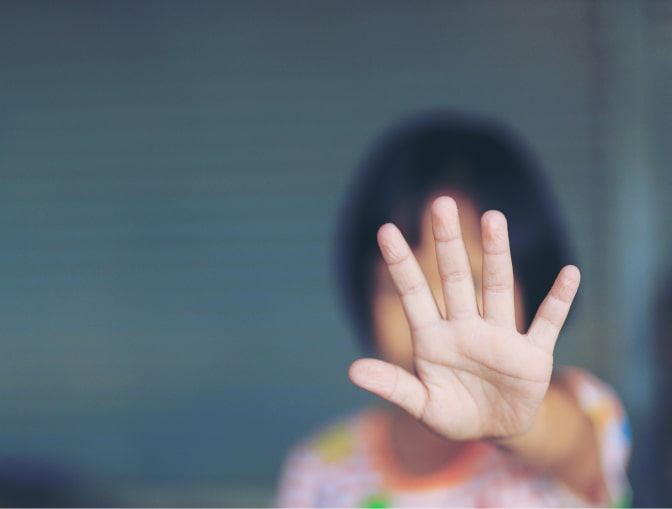The National Child Traumatic Stress Network estimates that up to 60% of American adults have gone through at least one traumatic event as a child. Feeling alone and isolated, guilty or humiliated, having trouble trusting others, controlling their emotions, and having physical health issues are all common responses to childhood trauma.
While some people may overcome traumatic experiences as children with little long-term impact, others may experience years or even decades of suffering. Knowing the signs is essential to getting the treatment you require.
Childhood trauma defined
Childhood trauma is an event experienced by a child (0-18 years of age) that evokes fear and is commonly violent, dangerous, or life-threatening. Adverse Childhood Experiences (ACEs) are a type of trauma that can occur in a child.
This type of event may also happen to someone your child knows, and your child is impacted by seeing or hearing about the other person being hurt or injured. When these types of experiences happen, your child may become overwhelmed, upset, and/or feel helpless. These types of experiences can happen to anyone at any time and at any age; however, not all events have a traumatic impact.
Trauma is defined as a deeply distressing or disturbing experience. It can be caused by various incidents, including but not limited to: natural disasters, abuse (physical, emotional, sexual), neglect, witnessing violence, and losing a loved one. All trauma is not equal, though; something traumatic for one person could be seen as typical or easily resolved for someone else.
Traumatic experiences can have a lasting impact on a child’s development. Children who are victims of trauma may have difficulty trusting others and regulating their emotions and may be more prone to developing mental health conditions such as anxiety and mood disorders. It is important to seek professional help if you or your child are struggling to cope with the aftermath of a traumatic event.
Causes of Childhood Trauma
- Rape | Sexual abuse
- Domestic violence
- Natural disasters
- Severe illness or injury
- Loved ones who passed away.
- Witnessing an act of violence
- Physical & emotional neglect
- Family members with mental health or substance use disorders
- Incarcerated household member
- Racism, discrimination, and oppression

Symptoms of childhood trauma in adulthood
Emotional
- Anger
- Strong reactions to triggers
- Anxiety & PTSD
- Emotional outbursts
- Panic attacks
- Childlike behavior
- Low self-esteem
- Fear of abandonment
Physical
- Shakiness
- Night terrors
- Lack of Energy
- Sleep disturbances | Insomnia
- Fatigue
- Raising heartbeat
- Muscle tension or pain
- Stomach problems
- Headaches
Behavioral
- Compulsion
- Eating disorders
- Impulsiveness
- Isolation
- Numbness or Callousness
- General disorientation | Brain Fog
- Hyperactivity and aggression
Traumatic events for children cause various reactions, and for some, can lead to Post-Traumatic Stress Disorder (PTSD), but it is important to note that not all exposure to trauma leads to a diagnosis of PTSD. An individual’s perception of trauma and perceived severity, as well as protective factors such as whether or not there is a safe and supportive environment, plays a significant role in developing this condition.
Depending on how severe the problem is, there are different categories into which the symptoms of post-traumatic stress disorder can be classified.
What are the types of PTSD?
Normal Stress Response
Acute Stress Disorder
This reaction arises after a life-threatening experience but does not exhibit the same symptoms as PTSD. After witnessing a domestic dispute, a natural disaster, or a shooting in a public place, acute stress disorder may develop. ASD has the potential to turn into PTSD if left untreated.
The most effective treatments for this type include group therapy, medication, and psychotherapy.
Uncomplicated PTSD
Complex PTSD
Complex PTSD is common in abuse or domestic violence cases, repeated exposure to war or community violence, or sudden loss. The disorder can occur in childhood or adulthood and affect relationships and behavior.
Numerous traumatic incidents bring on complex PTSD. Treatment for this type is more challenging, and behavioral problems with symptoms including excessive anger, avoidance, depression, or panic may be present. Mental health professionals typically manage complex PTSD in a facility where patients receive round-the-clock emotional care, medication monitoring, and daily treatment.
Complex PTSD can also present through physical health symptoms such as fatigue and chronic pain.
Comorbid PTSD
Comorbid PTSD
Co-occurring mental conditions are common in people with comorbid PTSD. It frequently appears to be associated with problems with substance abuse.
The following are some examples of co-occurring conditions:
- Anxiety disorder
- Panic disorder
- Major depressive disorder

Effects of childhood trauma as an adult
EFFECT ON STABILITY, GUILT, AND SHAME
ADULT ATTACHMENT DISORDERS
Numerous adult attachment disorders can develop when a child experiences abuse from caregivers or parents. These may include:
Dismissive-Avoidant Attachment occurs when a person tries to avoid creating an emotional bond with, becoming attached to, and being close to others.
This type of attachment develops when a child’s needs are disregarded or rejected by the caregiver. To save themselves from being rejected once more as an adult, the child can be extremely independent.
Fearful-Avoidant Attachment. It is normal for some children to fear intimacy and close relationships when they witness and endure abuse and neglect. Adults with fearful avoidant attachment are frequently suspicious, have trouble articulating their emotions, and may appear distant from their partners.
Anxious-Preoccupied Attachment. This adult may come out as needy or clinging, and they frequently ask for relationship affirmation. Since they had inconsistent emotional support from their parents as children, they will never be completely secure. When a child is repeatedly loved and rejected, they begin to wonder where they fit in and need constant affirmation constantly.
For instance, anxious preoccupied attachment sufferers strongly desire to be wanted. They obsess over relationships and hold their potential partners in high regard. As a result, they need affirmation and validation often. A partner can find that demanding and challenging to uphold.
LONG-TERM EFFECTS OF CHILDHOOD TRAUMA
Childhood trauma has a wide range of impacts, each unique to the particular child and the incident. Children who come from homes that don’t give them a sense of safety and protection may turn to create their personal coping mechanisms to function daily and simply survive. They can live on eggshells as they become used to being lashed out at by their parents or caretaker. A person becomes highly sensitive to each interaction and others’ moods, fearful that he or she will fly into a rage. These kids learn to adapt by repressing their feelings and disguising their anxiety, anger, and sadness.
The National Child Traumatic Stress Network asserts that there are direct links between childhood trauma and reckless behavior, including smoking, unprotected sex, and developing chronic illnesses like cancer and heart disease. Abuse victims are more prone to feel stress and anxiety in adulthood. These chronic illnesses can bring on physical symptoms and psychological issues throughout life.

Treatment for childhood trauma survivors
Cognitive processing therapy (CPT)
Trauma-focused cognitive behavioral therapy (TF-CBT)
Eye movement desensitization and reprocessing (EMDR)
Narrative exposure therapy (NET)
Prolonged exposure therapy (PE)
Play therapy
Support Groups
Complementary and Alternative Medicine (CAM)
An alternative approach to trauma treatment and prevention falls outside clinical medicine. These may also include, among many others, tai chi, yoga, meditation, acupuncture, homeopathy, oriental medicine, massage therapy, herbal medicine, electromagnetic therapy, hypnosis, and creative therapies like dance and music. These techniques are classic approaches to healing trauma without prescription medication.
Comprehending the Persistent Impacts of Childhood Trauma
Integrative, holistic, and functional medicine specialist Dr. Truc Nguyen of Conscious Medicine stated, “From the ACES study, it is important for us to recognize and understand that over 67% of physical health dysfunctions are rooted in childhood attachment traumas. To be effective at managing illnesses, we need to address these traumas. We need to identify and address any childhood traumas to bring resolution to health dysfunction as a holistic approach.”
For someone who has experienced childhood trauma, you may be dealing with several physical symptoms that can impact your well-being. These may include low self-esteem, difficulty forming relationships and trust, and drug or alcohol use issues. Additionally, there is evidence that childhood trauma is linked to health problems such as heart disease, gut issues, obesity, chronic fatigue, brain fog, autoimmune issues, and chronic pain.
If you are experiencing these symptoms, it is important to seek help from our Integrative Functional Medicine practitioner. With proper treatment and support, it is possible to overcome the effects of childhood trauma and live a healthy and fulfilling life.

